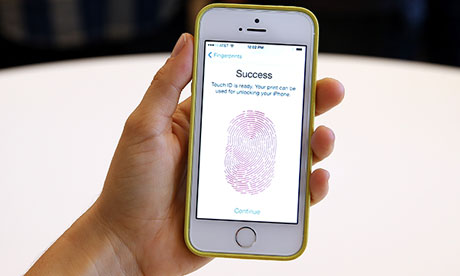
The new iPhone 5S with fingerprint technology - which may partly explain its 64-bit chip. Does Samsung need one too? Photograph: Justin Sullivan/Getty Images North America
Samsung will follow Apple by having a 64-bit version of its Galaxy smartphones, according to the company's co-chief executive. When? That's less clear. "Not in the shortest time. But yes, our next smartphones will have 64-bit processing functionality," said Shin Jong-Kyun, talking to journalists in South Korea, and reported in the Korea Times.
Apple announced on Tuesday that its newly announced top-end iPhone 5s will have a 64-bit ARM chip, which it says will be important for delivering the smartphone's improved performance over its predecessors. That will make it the only 64-bit phone in the world; it is understood that the iOS operating system has been rewritten so that it has both 32- and 64-bit versions.
64-bit chips can in theory perform more detailed floating-point calculations because they have larger registers for storing numbers - essential to represent non-integer numbers in binary. Such calculations are needed in graphics and other tasks involving analogue data. They can also access more than 4GB of RAM, unlike a 32-bit system, but in a smartphone that carries a penalty because the RAM has to be powered - consuming battery life.
Apple hasn't specified why the 64-bit chip has been included, though there has been speculation that it is needed to do calculations to validate fingerprints presented to the home button sensor on the 5s, and to perform processing on pictures taken with the "burst" mode from the still camera and "slo-mo" - double-speed-capture - video.
AppleInsider explains the origins of the new 64-bit A7 chip in the 5s, and notes that it means "big math problems can be worked out faster in larger chunks… allowing the processor to finish its work faster and drop back down into a low power mode".
Apple has also ported its own kernel code and libraries to 64-bit, and rewritten its built-in apps for it.
However, Samsung will not be able to rely on a 64-bit Android being available. That means that if it introduces a 64-bit chip it will not be using its capability. As the OS on which apps run would be 32-bit, none would be able to take advantage of the 64-bit architecture.
That in turn means that Samsung's next flagship phone in 2014, probably the S5, either won't have or won't be able to take advantage of a 64-bit chip.
But for Samsung, which earlier this year claimed a first by introducing a version of the Samsung Galaxy S4 with eight cores - twice as many as the previous maximum - seeing Apple steal a march on it in a technical field could otherwise be galling.
"Sense does not always prevail though, and much boils down to being able to say 'we can do it too', even if there is no reason for [doing] it," remarked Carolina Milanesi, smartphones analyst at the research group Gartner.
The two companies have vied for supremacy in the smartphone market for years, and Apple has sued the South Korean company for copying its designs and infringing patents relating to the function of its phones and tablets. In August 2012, Samsung was fined a total of $1.05bn in a California court, though the case is still ongoing: around $400m of the damages awarded by the original jury have been voided, and a retrial starts in November to determine whether to raise or lower them.
via apple - Google News http://news.google.com/news/url?sa=t&fd=R&usg=AFQjCNHYrYrLXtfk-kuFZy0NfXHxC8Gh7Q&url=http://www.theguardian.com/technology/2013/sep/12/samsung-apple-64-bit-smartphone













0 comments:
Post a Comment